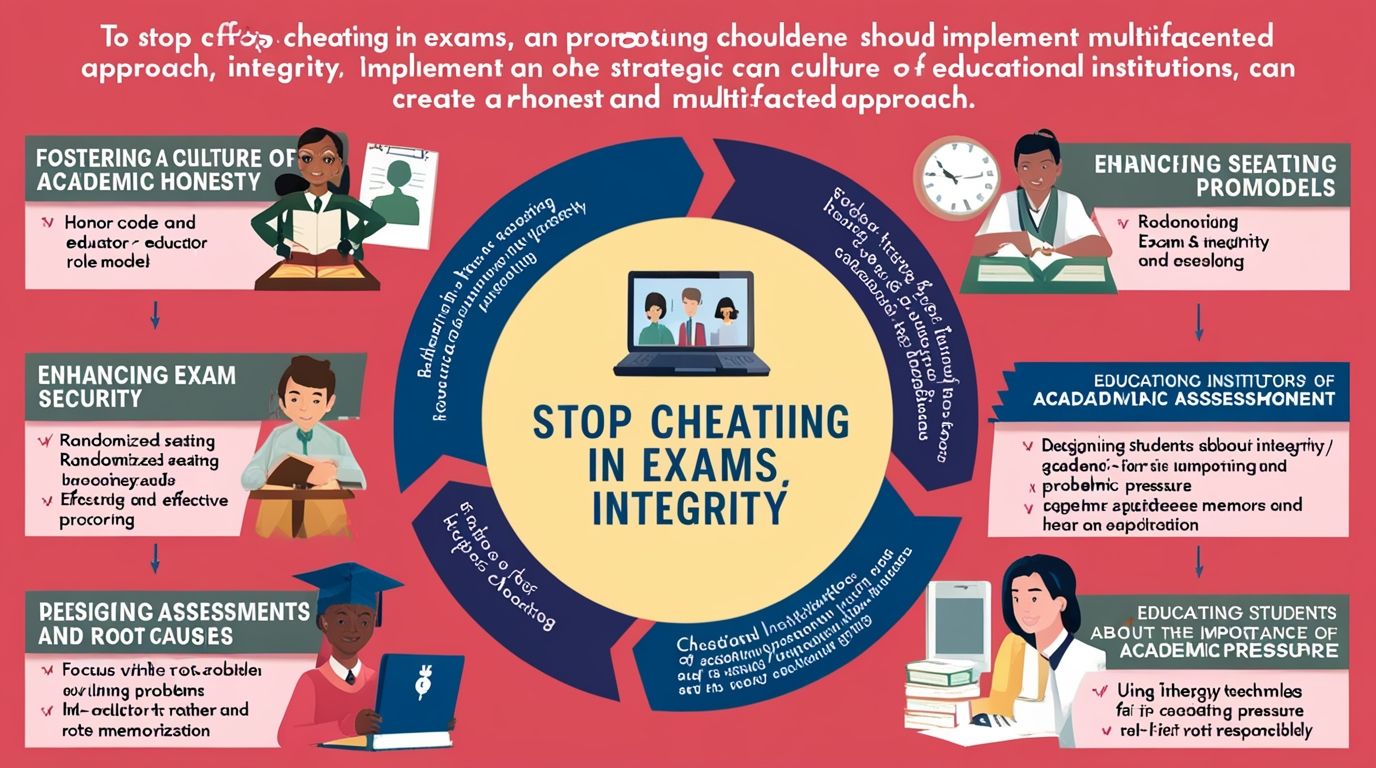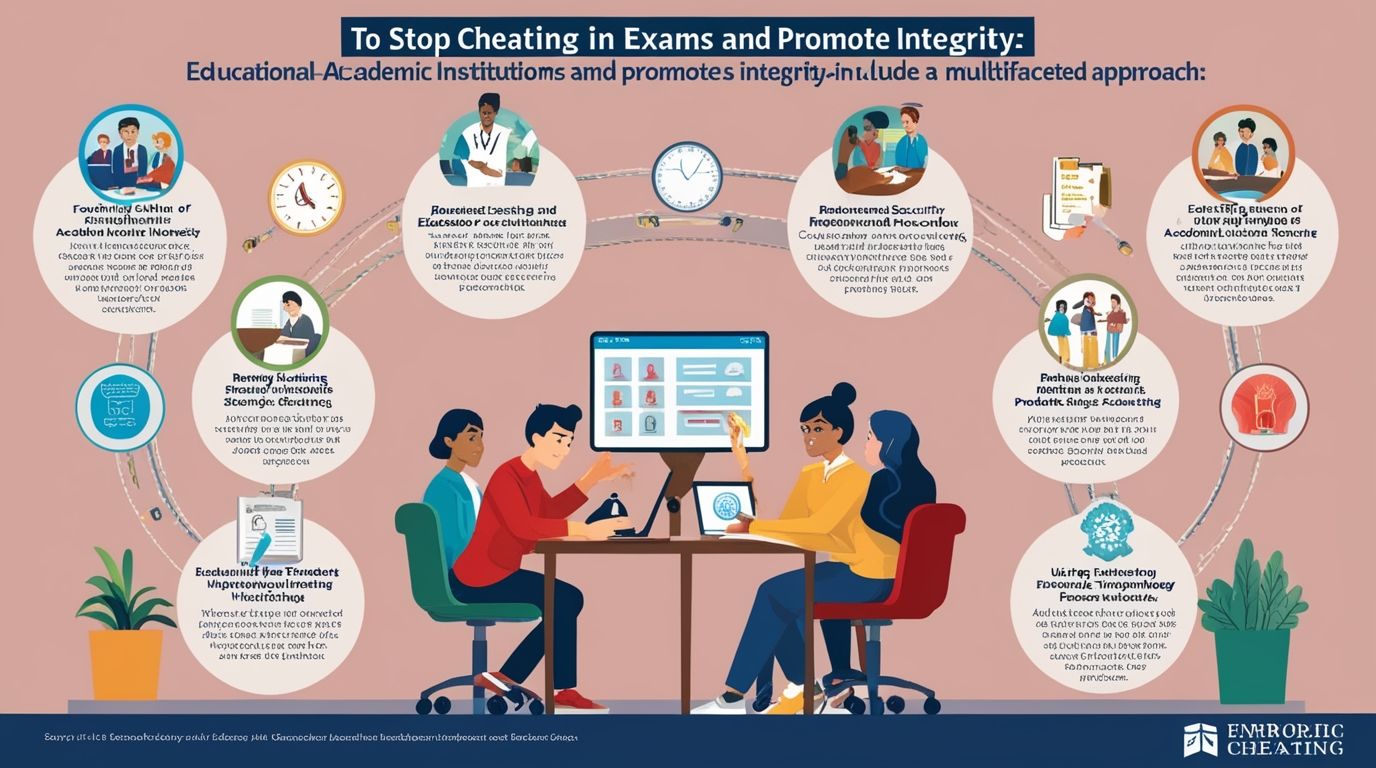How to Stop Cheating in Exams Strategies for Integrity and Fairness Cheating in exams is a widespread issue that undermines the integrity of the educational system and the value of academic credentials. This problem has persisted across generations, becoming more sophisticated with advancements in technology. Stopping cheating in exams requires a multifaceted approach that addresses the root causes and implements effective preventative measures. In this article, we will explore various strategies that educational institutions, teachers, students, and policymakers can adopt to curb cheating and foster a culture of academic integrity.
Understanding the Causes of Cheating
Before implementing solutions, it is essential to understand why students cheat. Several factors contribute to this behavior:
- Pressure to Succeed: Many students feel immense pressure from parents, teachers, and society to perform well academically. This pressure can lead them to cheat as a way to meet expectations and avoid failure.
- Lack of Preparation: Some students resort to cheating because they unprepared for the exam. This lack of preparation can stem from poor time management, difficulty understanding the material, or a lack of interest in the subject.
- Perception of Low Risk: If students believe that they unlikely to be caught or that the consequences of getting caught minimal, they may be more inclined to cheat.
- Peer Influence: When students see their peers cheating without facing repercussions, they may be more likely to engage in similar behavior.
- Technological Advances: The proliferation of smartphones, smartwatches, and other digital devices has made it easier for students to access unauthorized information during exams.

Strategies for Preventing Cheating
To effectively combat cheating, a combination of preventative measures, deterrents, and educational initiatives must be implemented. Below are several strategies that can help reduce the incidence of cheating in exams.
Creating a Culture of IntegrityOne of the most effective ways to prevent cheating is to cultivate a culture of academic integrity within the educational institution. This involves clearly communicating the importance of honesty and the value of earning grades through hard work and genuine effort.
- Honor Codes: Implementing an honor code that students must sign can reinforce the importance of academic integrity. This code should outline the expectations for ethical behavior and the consequences of cheating.
- Role of Educators: Teachers and administrators should serve as role models of integrity. They should emphasize the importance of honesty in their interactions with students and consistently enforce policies related to cheating.
Enhancing Exam Security: Improving exam security is crucial in reducing opportunities for cheating. This can be achieved through various methods:
- Multiple Versions of Exams: Creating multiple versions of an exam with questions in different orders or with different question sets can make it more difficult for students to share answers.
- Randomized Seating Arrangements: Assigning students to seats randomly on exam day can prevent them from sitting near friends or peers with whom they may collaborate.
Proctoring: Effective proctoring is essential to deter cheating during exams. Proctors should be vigilant, attentive, and trained to recognize common cheating behaviors.
- Use of Technology: Schools can use technology to monitor exams more effectively. For example, plagiarism detection software can identify copied answers, and lockdown browsers can prevent students from accessing unauthorized websites during online exams.
- Redesigning AssessmentsTraditional exam formats may inadvertently encourage cheating. By redesigning assessments to focus on higher-order thinking and problem-solving, educators can reduce the likelihood of cheating.
Open-Book Exams: Open-book exams can minimize the temptation to cheat, as students have access to their notes and textbooks. These exams can designed to assess students’ ability to apply knowledge rather than recall facts.
- Project-Based Assessments: Replacing some exams with project-based assessments can encourage students to engage deeply with the material and demonstrate their understanding in creative ways.
- Frequent Quizzes: Instead of relying solely on high-stakes exams, educators can administer frequent, low-stakes quizzes. This approach reduces the pressure on any single assessment and discourages cheating.
Educational Programs on Academic IntegrityEducating students about the importance of academic integrity and the consequences of cheating can have a lasting impact on their behavior.
- Workshops and Seminars: Schools can organize workshops and seminars that focus on the ethical implications of cheating, the value of honest work, and strategies for effective study habits.
- Peer Mentoring: Older students or academic leaders can mentor younger students, helping them understand the importance of integrity and offering support in preparing for exams.
Addressing the Root Causes of CheatingTackling the root causes of cheating is essential for long-term success in preventing it.
- Reducing Academic Pressure: Schools and parents should work together to create a more balanced approach to academic achievement. Encouraging a growth mindset, where effort is valued over perfection, can help reduce the pressure that leads to cheating.
- Improving Study Skills: Educators can provide students with resources and support to improve their study habits. This includes teaching time management, effective note-taking, and test-taking strategies.
Counseling Services: Providing access to counseling services can help students who are struggling with stress, anxiety, or other personal issues that may contribute to cheating.
- Implementing Consequences and AccountabilityClearly defined consequences for cheating are necessary to deter students from engaging in dishonest behavior. However, these consequences must be fair, consistent, and transparent.
- Clear Policies: Schools should have clear, written policies outlining what constitutes cheating and the specific consequences for different types of violations.
Restorative Justice: In some cases, a restorative justice approach may be more effective than punitive measures. This involves having the student acknowledge their wrongdoing, make amends, and commit to ethical behavior in the future.
- Parental Involvement: Parents should informed of any incidents of cheating and involved in discussions about how to prevent future occurrences.
- Leveraging Technology Responsibly While technology can facilitate cheating, it can also be a powerful tool in preventing it when used responsibly.
Online Proctoring: For online exams, proctoring software can monitor students through their webcams and detect suspicious behavior. Some systems can also flag unusual patterns, such as excessive eye movement or prolonged periods of inactivity.
- Plagiarism Detection Tools: These tools can be used to check students’ written work for similarities with existing sources, helping to prevent cheating on essays and research papers.
- Learning Analytics: By analyzing data from students’ online activities, educators can identify patterns that may indicate cheating. For example, a sudden improvement in performance or unusual similarities between students’ answers can be flagged for further investigation.
Conclusion
Stopping cheating in exams is a complex challenge that requires a comprehensive approach. By understanding the underlying causes, enhancing exam security, redesigning assessments, educating students, and implementing fair consequences, educational institutions can create an environment where academic integrity is the norm. It is also essential for educators, students, and parents to work together in promoting honesty and integrity as core values. Through these efforts, we can reduce cheating and ensure that academic achievements truly reflect a student’s knowledge and abilities

4 thoughts on “How to Stop Cheating in Exams Strategies”
Comments are closed.